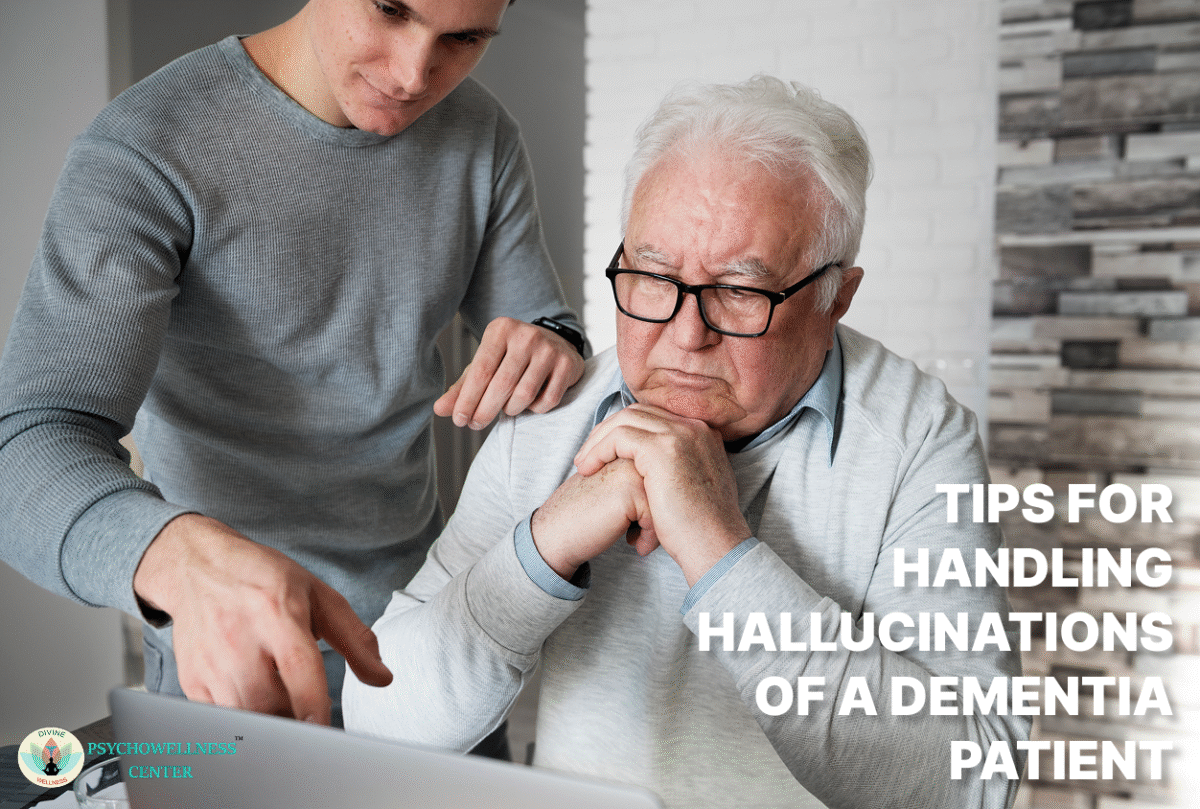Introduction
Dementia is a progressive neurodegenerative disorder that affects memory, thinking, behaviour, and the ability to perform everyday activities. Among its many symptoms, hallucinations—seeing, hearing, or sensing things that are not real—can be particularly distressing for both the patient and their caregivers. Understanding how to respond compassionately and effectively is crucial for ensuring the comfort and dignity of individuals living with dementia.
Understanding Dementia and Its Symptoms
Dementia is not a single disease but an umbrella term for conditions like Alzheimer’s disease, Lewy Body Dementia, Vascular Dementia, and Frontotemporal Dementia. According to the World Health Organisation (2024), more than 55 million people globally live with dementia, with nearly 10 million new cases every year.
Common Symptoms of Dementia Include:
- Memory loss
- Confusion and disorientation
- Difficulty with communication
- Poor judgment
- Personality changes
- Delusions and hallucinations
Hallucinations are more common in certain types of dementia, especially Lewy Body Dementia and Parkinson’s disease dementia. They can involve any of the senses, though visual hallucinations are most frequent.
Case of Mr. Rajiv Mehta
Mr. Mehta, a 72-year-old retired engineer, was diagnosed with Lewy Body Dementia. Over time, his family noticed he began seeing people in the house who weren’t there. He frequently insisted that children were playing in his bedroom at night. He would talk to them, ask his wife to make snacks for them, and become agitated when told the children were not real.
Initially, the family tried to correct him, saying, “There are no children, you’re imagining things,” which only increased his frustration. Eventually, after consulting a psychologist and a psychiatrist, the family was guided on how to manage the hallucinations more effectively, with empathy, redirection, and minimal confrontation.
Tips for Handling Hallucinations in Dementia Patients
1. Stay Calm and Non-Confrontational
It’s essential not to argue or try to convince the person that their hallucination is not real. Instead, respond with reassurance:
- Say: “I see that you’re worried. I’m here with you.”
- Avoid: “That’s not real. You’re wrong.”
2. Validate Their Emotions
Even if the hallucination is false, the emotions felt are very real.
- Example: Mr. Mehta once screamed, “The boy is in the cupboard!” Instead of denying it, his caregiver said, “Let’s check together and make sure everything’s okay.”
3. Redirect the Conversation
Distraction can help break the loop of hallucination.
- Try offering a snack, turning on music, or suggesting a walk.
- Use items the person enjoys, photos, soft blankets, or music from their past.
4. Adjust the Environment
Poor lighting or shadows can trigger hallucinations.
- Keep rooms well-lit.
- Remove mirrors, which may be confusing.
- Use calming colours and reduce clutter.
5. Monitor for Triggers
Certain triggers, like medications, stress, anxiety, fatigue, or sensory overload, may increase hallucinations.
- Maintain a structured daily routine.
- Limit caffeine and overstimulation.
- Review medications with the doctor (e.g., anticholinergic drugs may worsen hallucinations).
6. Document and Communicate
Keep a journal to record the type, frequency, and triggers of hallucinations.
7. Seek Professional Help
Psychologists, therapists, neurologists, and dementia specialists can help in managing hallucinations with behavioural strategies or medication when necessary.
8. Distract the person.
Distract the person. Sometimes shifting to another room helps.
Here are some tips to help cope:
- Don’t argue about what’s true.
- Let the person know that they are safe.
- Use gentle touching or hugging to show the person you care.
- Explain to others that the person is acting this way because they have dementia.
- Search for things to distract the person; then talk about what you found. For example, talk about a photograph or a keepsake.
When to Consider Medication
Non-drug approaches are always the first step. However, if hallucinations become frequent, frightening, or lead to aggression, doctors may prescribe antipsychotics cautiously. Medications like quetiapine or rivastigmine are sometimes used but must be monitored closely due to side effects, especially in elderly patients.
Caregiver Self-Care Matters Too
Supporting a loved one through hallucinations can be emotionally exhausting. Caregivers should:
- Join dementia support groups.
- Take regular breaks.
- Seek counselling or therapy if needed.
As in Mr. Mehta’s case, the emotional toll on his wife was significant until she got help from a local caregiver group and learned mindfulness techniques for stress.
Conclusion
With compassion, patience, and informed strategies, caregivers can significantly reduce distress and enhance the quality of life for both the patient and themselves. Incorporating mindfulness techniques can also help caregivers remain calm and grounded during difficult moments, allowing them to respond with empathy rather than frustration.
Today, platforms like TalktoAngel offer access to online counselling and connect families with professionals who specialise in dementia care, geriatric mental health, and neurocognitive disorders. Evidence-based therapies such as Cognitive Behavioural Therapy (CBT), family counselling, psychodynamic support, and environmental modification strategies are available to help families cope more effectively.
For those seeking professional guidance, the Psychowellness Center, located in Dwarka Sector-17 and Janakpuri, offers in-person counselling, therapy sessions with some of the best psychologists near me, providing compassionate, evidence-based care tailored to the emotional and behavioural challenges of dementia. Additionally, TalktoAngel ensures secure and confidential counselling from the comfort of home. Both services are committed to creating a safe, supportive environment where healing through healthy relationships and professional care can begin and thrive.
Always remember, you’re not alone. With the right support, navigating the journey of dementia becomes less overwhelming and more compassionate.
This article emphasizes the valuable insights of distinguished experts, Clinical Psychologist Dr. R.K. Suri and Counselling Psychologist Ms. Sangeeta Pal, who provide practical methods and guidance to enhance emotional resilience and support long-term mental well-being
This blog was posted on 27 August 2025
References
- Alzheimer’s Association. (2023). Understanding Dementia: Types, Symptoms & Treatment. www.alz.org
- World Health Organization. (2024). Dementia: Key Facts. https://www.who.int/news-room/fact-sheets/detail/dementia
- Mayo Clinic. (2024). Lewy Body Dementia: Symptoms & Management. www.mayoclinic.org
- NICE Guidelines (UK). (2023). Dementia: Assessment, Management and Support. www.nice.org.uk

